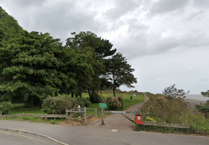A POTENTIALLY harmful chemical banned in many European countries is to be used again to kill weeds on the streets of Minehead.
It follows the failure of a six-month trial of a biodegradable system of controlling weeds without using toxic chemicals which cost the town council nearly £17,000.
The system, called Foam Stream, had some success and seemed to align with the council’s environmental objectives, but did not stand up to the ‘unique operational challenges’ in Minehead.
The council was looking to replace the use of herbicides containing glyphosate, which was facing a UK ban because of concerns over its environmental impact and possible effects on human and animal genetic material and nervous systems.
Now, town councillors have agreed to go back to using the chemical, starting in March, but with tighter controls to mitigate public concerns.
Town clerk Ben Parker said council staff would manually remove as much weed and detritus as they could, and a qualified contractor would use the herbicide with equipment for precision treatments only on main streets and not in service lanes, managed estates, or unadopted highways.
Mr Parker said treatments would stop if the weather was not suitable, and ‘adjuvants’ would be included in spray mix to reduce drift and improve efficiency of the applications.
He said: “While concerns about glyphosate persist, clear communication about its application and safety often alleviates these worries.
“Through advancements in technology and increased research into glyphosate, combined with the lessons learned from alternative methods, the council is well-positioned to reintroduce glyphosate in a safe and controlled manner.
“Residents have expressed dissatisfaction with the effectiveness of alternative methods attempted since its withdrawal and the perceived lack of control of street weeds.
“Transparent communication about glyphosate use, supplemented by educational resources, will address concerns and foster public trust.”
Mr Parker said glyphosates had been the primary herbicide for street weed control worldwide since the 1970s and had been applied ‘comprehensively and liberally’ to street weeds and open spaces.
He said the UK intended to ban the chemical from the end of 2025, but the Department for Environment, Food and Rural Affairs had now indicated its current licence would probably be renewed.
The European Food Safety Authority and Chemicals Agency had already in November, 2023, extended glyphosate approval for 10 years.
Mr Parker said the plan was to reintroduce glyphosate in Minehead for hard-surface weed control using a professional contractor while ensuring minimal habitat impact by excluding open spaces, maintaining robust stakeholder and contractor management, and transparent public communications, inviting all types of feedback.
He said the council’s preferred contractor had ‘vast experience’, industry-recognised accreditations, and advanced application systems.
Councillors were told they would receive an annual report, including an evaluation to further refine methods and address any emerging concerns, if required.
Mr Parker said manual weed and detritus removal would be carried out in high-priority areas from January to March, with glyphosate applications in March, July, and September, reducing to only twice in the second year.





Comments
This article has no comments yet. Be the first to leave a comment.